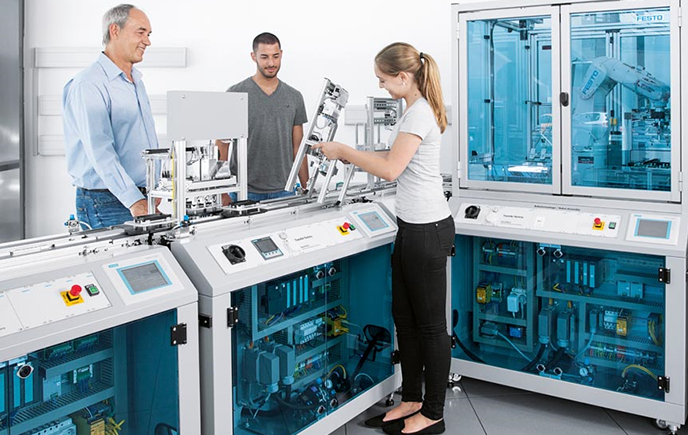Full steam ahead - Scottish distillery with Grundfos
There’s steam and there’s high-quality steam. There are pump solutions and intelligent pump solution...
As the Fourth Industrial Revolution continues to evolve and progress, developing and introducing new technologies to enhance the way we operate, we must ensure that we also remain focused on upskilling our current knowledge base if we are to truly understand the opportunities that we are presented with.

Due to the vast array of emerging technologies flooding the market, it’s unlikely that any one engineer could be a master of all, which now places greater demand on developing softs skills to ensure that new opportunities are understood, realised and capitalised on.
Festo Food & Beverage Industry Manager, Andy Macpherson, commented: “These soft skills include a need for greater analytical thinking and complex problem-solving capabilities, as well as greater creativity and cognitive flexibility to help integrate robots and cobots safely into production.
“The challenges of implementing new technologies requires a cross-function approach and at times it can take longer to get the people talking than the machines. All engineers in the food industry – from corporate level through to heads of engineering and shop floor personnel – will need to constantly and increasingly update their skillsets. The acceleration of technology is becoming hyperbolic, therefore the half-life – the decay of their knowledge – will rapidly decrease.”
So, what are the most important skills required by engineers who are setting out to implement and run a digitalised food facility? These skills fall into two main areas – technical and soft skills.

New technology skills involve understanding IT networks and the cloud, data gathering and analytics, cyber security, robot and cobot safety and integration, AI application and smart maintenance. While soft skills draw down on improving analytical thinking, people and team management, emotional intelligence and creativity, and decision making. The difference is vast, but both equally important in optimising production and effective implementation, not only in the food sector, but any that wishes to adapt such technology.
To help companies drive the implementation of new technologies in a non-disruptive manner, Made Smarter published their six guiding principles for digitalisation, asking businesses to commit to themselves in order to drive towards producing good jobs, improving productivity and achieving a cleaner footprint.
Each of the following categories have been suggested to incite improvements within businesses as we continue our Industry 4.0 journey. They are:
The UK Food and Beverage sector has much to gain from the adoption of increased automation and new digital technology. However, it now remains more vital than ever that the adoption of new engineering skills, alongside upskilling existing know-how, continues within workforces if we are to bring this industry into the new era. To put it bluntly, time must be invested in both soft and hard skills, if we are to realise its potential.

“When setting out on your Industry 4.0 journey, it’s essential to have a vision of what your business wants to achieve,” said Keith Thornhill, Head of Food & Beverage Industry at Siemens Digital Industries UK. “Digitalisation offers the tools to achieve your goals, but we must begin with minor, slow adaptations to existing equipment.”
The fact is soft skills are required to help the workforce adapt and adopt to change. Introducing cobots and robots to production can help humans undertake more meaningful and intelligent tasks, but we first must accept them as workmates that add value. Engineers, machine operators and other factory employees are encouraged to upgrade their skills to be aware of new technologies that are implemented, and also the language associated with it.
Thornhill added: “Not everyone can be a data analyst, but a basic understanding and training should be provided to support the workforce with their new digitalised job function.”
Speaking with Mettler-Toledo Head of Systems Engineering, Ian Cumming, he commented: “A key issue for us is finding engineers with appropriate expertise. There are many qualified people out there, but they often lack that relevant ‘hands-on’ experience.”
To address this skills gap, the product inspection company participate in a range of engagement initiatives, including working with local schools, delivering workshops to give students first-hand experience in the manufacturing sector. The company also offers apprenticeship programmes that introduce new recruits to the varied experiences and environments from the outset.
Concluding, Cumming said: “The success of our own apprentice scheme relies on the support and commitment of all team leaders. For industry to prosper, this sense of purpose needs to be replicated. It is incumbent on every company to work with colleges and universities to nurture and develop the skills they need to remain successful, and provide a platform for prospective engineers and technicians to gain valuable, hands-on experience.”
Industry 4.0 is a vision and roadmap of standards that unlocks increased productivity, new business opportunities and growth, and although not a new technology, it’s an acceleration of the existing trend of automation and digitalisation.

Projects around digital maintenance and energy saving have shown to have fast paybacks, but the challenges of implementing these new innovations remain. One thing is for certain, we must not lose sight of a traditional people orientated approach if we are to achieve our goals.
The introduction of new technologies to make production quicker, more efficient and more reliable will no doubt continue to benefit industry as a whole, but humans are central to achieving our true capabilities, therefore maintaining a high level of knowledge and expertise remains the ultimate goal.
Get the latest updates from ERIKS including:
Choose any or all of these via the ERIKS Subscription Centre!
Our Know+How brings together the best of the latest Know+How Hub articles in one easy to digest magazine, covering the following topics:
That's why its the leading magazine for maintenance engineers from ERIKS.
Want Know+How Magazine delivered direct to your door? Visit the ERIKS Subscription Centre to opt-in!
Take a look at our latest updates...
There’s steam and there’s high-quality steam. There are pump solutions and intelligent pump solution...
Looking for a custom Product quote? Need an answer to a Technical question? Looking for Careers/HR support? Want to work with us? Interested in our Digital Trading solutions? Have a finance question? Send us your enquiry and a member of the ERIKS team will be with you quickly.
We strive to deliver exceptional quality service and products. As part of this goal, we encourage customers to submit feedback on their experiences so we can resolve any issues and concerns.
At ERIKS we strive to deliver the best quality service and products. As part of this goal we encourage customers to submit feedback on their experiences so we can resolve any issues and concerns.
Call us: +441215086000
